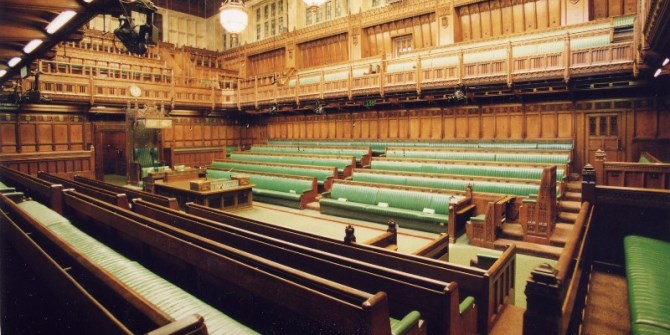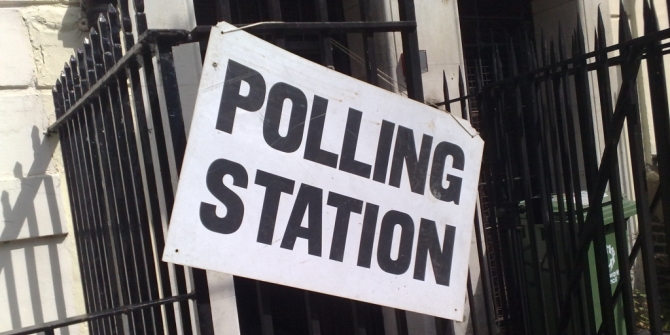 Democratic Audit’s Sean Kippin recently interviewed the polling and public opinion specialist John Curtice. Here, he argues that the Conservatives will find it very difficult to win a majority in the House of Commons in 2015, and that Ed Miliband has not succeeded in framing a compelling narrative to justify voting Labour.
Democratic Audit’s Sean Kippin recently interviewed the polling and public opinion specialist John Curtice. Here, he argues that the Conservatives will find it very difficult to win a majority in the House of Commons in 2015, and that Ed Miliband has not succeeded in framing a compelling narrative to justify voting Labour.
The General Election polls are quite erratic but seem to be tightening, with the economic recovery seeming to be having a marginal effect on voting intention. The Conservatives seem to be in a fairly promising position. Do you think that’s the case?
The problem facing the Conservatives is that so far this is a voteless economic recovery. Any narrowing of the opinion polls that have taken place in the last couple months is a consequence of the decline in Labour support, it’s not a consequence of a rise in Conservative support. Why? Well I think that at least a crucial part of the story is that the electoral battles so far as far as the Conservatives are concerned is not with the Labour party.
Transfers from the Conservatives to Labour are relatively rare. The degree of transfer from Conservatives to Labour in the 1990s was unusual. But certainly in this period the loss of conservative support is to UKIP. 70 per cent of those people who have defected from the Conservatives since 2010 have defected to UKIP. So therefore almost undoubtedly if the Conservatives are going to begin to recover their position the first port of call are those people who were Conservatives and have gone to UKIP.
The fascinating thing about UKIP supporters is that some of its obvious position; such as its anti-European, anti-immigration stance, are issues on which it is frankly impossible for the Conservatives to match the UKIP offer. But the other characteristic of UKIP supporters which is really important in my view is that they are economic pessimists. Actually in many opinion polls these days you will find that UKIP supporters are more pessimistic about what’s going to happen to the economy in general or their own personal finances in particular over the course of the next 12 months.
Not surprisingly, UKIP support is very working class, older, and outside London. We are talking about the section of Britain’s population which has suffered a decline in living standards, for whom the economic recovery is something that’s happening elsewhere. Therefore the Conservatives’ problem is that the economic recovery has got to reach much deeper into the social fabric of British society if they’re going to get these voters back. In the moment at least there isn’t much sign of it doing so.
UKIP has changed the rules of the game. One of the ways in which it has changed the rules of the game is that it’s not just got unto itself a group of people who have been left behind culturally, it has also got unto itself a group of people who feel left behind economically. The first you can’t do anything about, the second you hope the economic recovery would help you to get but the economic recovery has got to be much stronger and much more widely spread, or has got to be sold more effectively.
It does therefore suggest, for example, that policies like Help to Buy are completely targeted at the wrong demographic. Help to Buy is targeted at young professionals. You actually need to think of policies that are targeted at older, less well-off working class people. Dealing with zero-hour contracts probably does make sense, trying to raise the minimum wage probably does make sense. The things that will actually affect the nature of the labour market, at the bottom end of the labour market, is probably what matters because that’s where you have to get the economic recovery felt.
It’s a difficult problem for the Tories; it’s not obvious how easily they’re going to get all these folk back. The Tories face two fundamental problems: First, their coalition partners are in too much electoral trouble for the Tories own good, and although Liberal Democrat supporters aren’t just going to Labour (particularly you have to watch for Liberal Democrat seepage to the Greens), but basically the reason why the Labour party is in the lead is because of the loss of Liberal Democrat support to Labour. It goes all the way back to 2010 and it’s not obvious that it’s going to go back anytime soon.
The second fundamental problem is just the boundaries. The night the Tory backbenches effectively scuppered House of Lords reform was the night they almost undoubtedly made it impossible for their party to win an overall majority. They just have to be enormously way ahead. At a minimum, even under the most optimistic assumptions, you got to have something like a six-point Tory lead. That’s going to be tough unless UKIP disappears almost entirely. UKIP have kept going at a phenomenally high level now for over 12 months. It’s difficult to see how the genie will go back in the bottle. Maybe to a degree it will, but I think it will be shining quite a considerable light and that will create a shadow over the Conservative’s prospect.
This Parliament has seen two big shifts in voter opinion: from the Liberal Democrats to Labour and from the Conservatives to UKIP. Is that a permanent state of affairs? Or will a First-Past-the-Post electoral system and a general election with a heightened turnout reverse that?
I see no reason why the general election should result in a transfer of voters back from Labour to the Liberal Democrats unless there is a severe decline in Labour’s ability to offer anything. Because in a sense those Liberal Democrat voters that are going to Labour are primarily there because of push rather than pull. So the obvious weaknesses in what the Labour party is able to offer the electorate in the way of presenting people with an alternative might actually be a good idea, all of which are undoubtedly there. Probably not so crucial for these voters because they’re just pissed off. However, Labour needs to watch the Greens because the Greens are potential alternative form of protest for Lib Democrat voters, as are to some degree UKIP.
One certainly anticipates that UKIP support will fall from the levels it’s currently at, which is around 15 per cent. It’s been running around levels way above 2010 and we have to remember this happens against a backdrop – already in 2010, we had an all-time record level of support for parties other than the Conservatives, Labour and Liberal Democrats. The hold of our conventional parties on the electorate has never been weaker, and therefore the argument that one hears from many a Tory is: ‘well, you may not like us terribly much but you hate Labour even more, therefore you’re going to vote for us.’ I mean frankly for today’s electorate it just isn’t going to wash with enough people. They actually have got to be pulled back positively.
We’re looking at an electorate that’s more willing to experiment, even for Westminster elections. There just seems to be enough people out there, for whom at the end of the day. I mean again, something that’s very very different is that we’ve probably never had a period when all three Westminster party leaders have been basically unpopular. There’s always been somebody to shine, at least a degree of popularity. We have at the moment two deeply unpopular party leaders and a PM who’s seen as no more than treading water, as average. He’s basically popular amongst Tories.
Do you think Ed Miliband’s unpopularity will have a significant electoral impact?
Well it’s obviously already pretty heavily factored into Labour’s position in the opinion polls, which is currently sitting at about 34 per cent. The difficulty for him is that when you’re that unpopular people stop listening to you. Therefore how do you succeed in communicating your message?
A lot of people will say that actually one of the reasons Ed Miliband is unpopular is that he hasn’t been very good at communicating his message in the first place. There have been isolated initiatives where he’s been successful, but there hasn’t been a coherent narrative. The Labour party have a leader who hasn’t managed to frame an effective message and that’s part of the reason why he is unpopular with the electorate.
The fundamental issue therefore is that Miliband has failed to present his party as a one that looks like an alternative government. The fact that he is not regarded as an alternative prime minister is symptomatic of that wider problem. That’s the reason why there’s a perception in the Labour party that they’re going to struggle to get more than 35-36 per cent of the vote. However if the Tories can’t get their support back from UKIP, and given the constituency boundaries, that could easily be enough for Labour to be the largest party and even hold an overall majority. Labour don’t need to do particularly well if a large number of votes go to UKIP.
Note: This interview was originally published on the Democratic Audit blog and gives the views of the interviewee, and not the position of the British Politics and Policy blog, nor of the London School of Economics. Please read our comments policy before posting. Image credit: UK Parliament
 John Curtice is Professor of Politics at Strathclyde University, and Chief Commentator at whatscotlandthinks.org, an ESRC funded website that offers a comprehensive collection of easily searchable data on attitudes towards Scotland’s constitutional future. For more information via Twitter see @whatscotsthink.
John Curtice is Professor of Politics at Strathclyde University, and Chief Commentator at whatscotlandthinks.org, an ESRC funded website that offers a comprehensive collection of easily searchable data on attitudes towards Scotland’s constitutional future. For more information via Twitter see @whatscotsthink.








Good piece. GDP may be increasing but given not everybody gets an equal share of the growth why do Conservatives expect credit for a recovery?
Danny Blanchflower points out in the Independent that living standards for the majority have fallen and real wages are down 8% since May 2010, who is going to vote for more of that?
It is my view that politicians from all sides of the House are not truly passionate about Inspiring as much public support and enhancing the voting turn out at the election. If this were the case, surely change in the weak political system would have started by now towards achieving a democratic platform suitable for ensuring fairness and justice is for ALL, right!!
Instead, I am sure that the public feel that there is sufficient evidence to suggest that politicians are more motivated about securing their own future role – as they continually build relationships with BIG business, which is responsible for funding most of our political system.
Acknowledging that MPs still have No Legal or Statutory Obligation to Represent anybody, and whatever their quality or degree of representations it still goes unmeasured for its achievement or quality of service, isn’t it NON-surprising that the public doesn’t want to vote for a ‘system’ that FAILS to work for them, but does everything to enhance the longevity of a politician?
Where else can you get away with paying a politicians a minimum of £67,000.00 a year and gaining very little, if any, positive results?